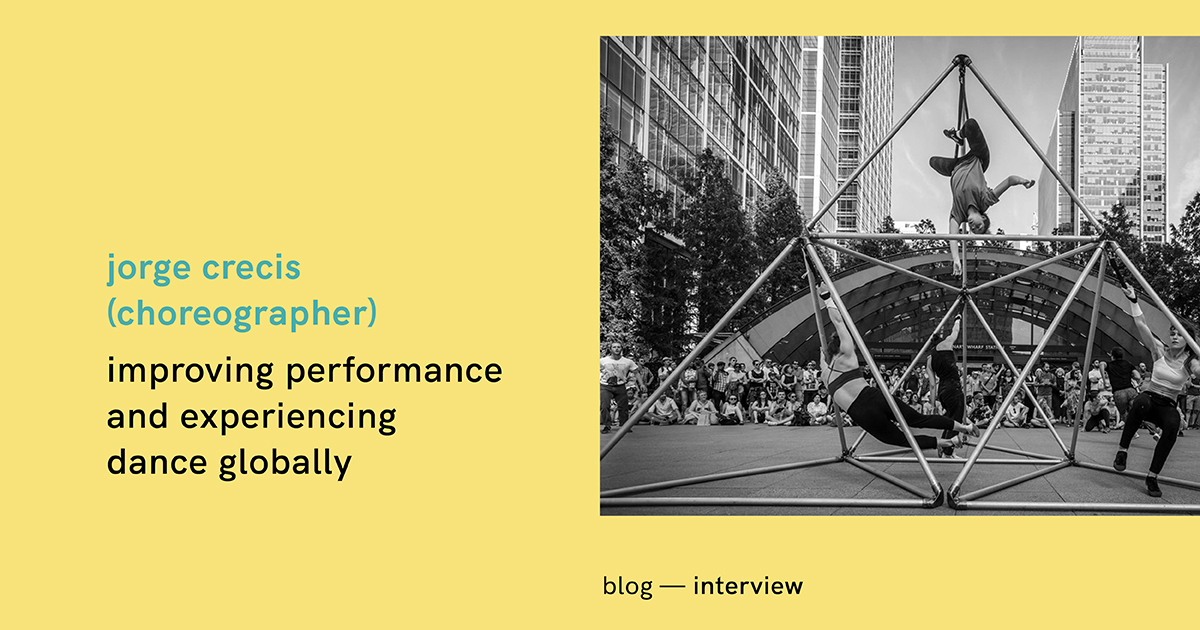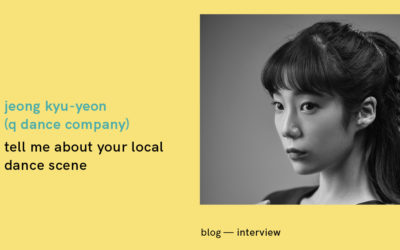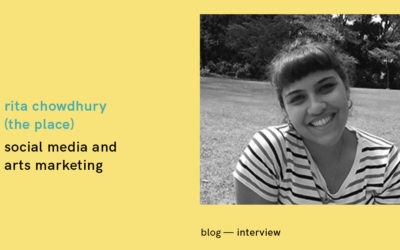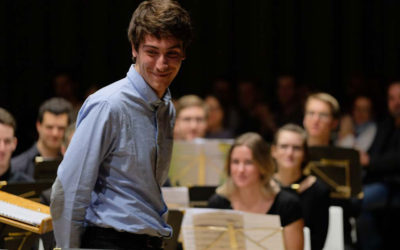Get to know Jorge Crecis, from his sports background to his dance work around the world
Jorge Crecis is a choreographer and the founder of Towards Vivencia, a cutting-edge methodology that provides a tool for improving performance presence through states of consciousness and highly effective body routines. We had the pleasure to chat with Crecis about his artistic journey, his most remarkable and funniest memories and how you can engage with Towards Vivencia.
Who are you?
My name is Jorge Crecis and I introduce myself as a former performer, lecturer, and choreographer. Also, I am the founder director of Towards Vivencia. My major inspiration is consciousness. Science doesn’t know what the mind, with the self, with the consciousness is. And I’m fascinated about how we can access that entity through dance.
What is the unique selling point of Jorge Crecis either on stage or while teaching around the globe? Overall, how did you build your dance methodology with higher states of consciousness?
I am someone who has started to dance really late. I was 22 years old when I had my first contemporary dance class, as a student. So, therefore, I never heard the comment ‘oh, you’re a great dancer’ or ‘your technique is amazing’. Every time, the only compliment that I’ve heard was ‘oh, you have such an amazing presence’ or ‘you look so much taller on stage’. To hear those comments were fantastic. So, I started thinking that my strength as a performer was my presence, but I didn’t know what it was. Over the last 20 – 25 years, I dedicate my time to research and to teach others what is that performance presence. And after a whole PhD, after choreographing all around the world, teaching in many universities, I cannot claim that I have the answer but I have one answer. I’ve been working with many different artists, many different teachers, and everyone agrees that the most important aspect of performance is presence. So, I think my unique selling point is that: after all this research and after all these years, I have a training methodology for developing performance presence. It’s almost like developing a unique technique to increase your stamina. That’s my unique selling point.
Can you share with us what is the concept behind Towards Vivencia?
Towards Vivencia’s name came because I realized that in English there isn’t any word that explains how to be fully present. So Vivencia is a name for those moments where, initially, there’s a lot of noise in our head saying ‘you’re about to perform’ and it’s like, ‘you’re not good enough’, ‘you don’t know the road, you’re gonna forget it’… There’s lots of noise. So the first step is actually step out, look at it and assume, ‘Well, that noise is not me, it’s just noise’. Actually, all those negative thoughts are only a mechanism from your brain. Once you know that, Vivencia goes one step further as it can be achieved by meditation and other many different ways. Vivencia is taking control of that noise: it creates a beautiful symphony of music in your head that leads your actions to be as good as you can be. And that is why I use the word vivencia in Spanish, as it is something that you experience in the moment and somehow transforms you.
How can people engage with Towards Vivencia? I dedicated the last few years going all around the world teaching this methodology, teaching how people can engage with those moments – how they can provoke those moments. I always use this example: if you want to work your upper body skills, I teach you how you do the right push-ups, or how to engage your core, how to properly do abdominals. My technique is about how to engage properly with those moments and how you can create them. However, it was frustrating because it was a short-term training… If I teach you how to do push-ups and then you never do them again, you are not going to develop your upper body skills. So, those workshops were somehow frustrating. That’s why I’ve decided to create a real training programme for people all around the world to do it online. Every week, I share exercises, tasks, points of views that support playfulness, commitment. So, with different exercises and different tasks, people train with me for a whole year and that’s when the real change happens, because you need a certain amount of time, food and exercise to develop the neural pathways that develop presence. This month of April 2021, we are opening the 10th edition. Also this year we created a programme for training – ‘Towards Vivencia Level 2’ – for people who also want to teach this methodology. It’s growing and I feel we found a way to help many people – not only to become better performers, but also to become more human beings.
What is your most remarkable memory to date? Any curiosity behind-the-scenes?
The funniest behind-the-scenes episode was some years ago in Siberia and I was very close to ending up in jail. I was in the middle of Russia teaching a workshop. On the last night, they invited me to meet them in a Square to go out for dinner. And I made a mistake and I went to another Square, so of course no one was there. At some point, the police came to me and said ‘Okay, passport’ and they started speaking to me in Russian. I’ve said to them ‘I don’t understand’ but I showed them my passport. And they took me to a very small room, took my phone and confiscated my passport. I started to get really scared, as I was in the middle of Russia, no one knew where I was at that moment. After a while, they asked me if I was a terrorist. Luckily I was able to call my friends and they came for me and they said I looked like a Chechenian terrorist that they were looking for. So, I was about to end up in jail (laughs) because they were thinking that my passport was fake and I was lying about everything. Fortunately, the Russian television made a little documentary of my classes during that week, so my friends showed it to the police and they released me after 3 hours.
A very special ‘behind-the-scenes’ was a few years ago. Together with other artists we created the first Arab dance company, including dancers from all the Arab world: Morocco, Tunisia, Egypt, Palestine, Libya, Jordan, Lebanon. As part of this company, we were performing in a public Square and I remember a member of the audience came to us and said ‘Thank you very much for this performance, because during the time you were performing, you took away the power of the people with weapons and you gave the power to the arts’. It was something remarkable that I will remember all my life.
In your opinion, how does dance become a more accessible language for everyone?
Covid has been very difficult for many different people, it has been devastating in certain areas. But one of the positive aspects is the democratization of dance. Now, it’s not only the people who hold big theatres or big festivals that have the power to teach you or to tell you who to see, who you are going to take classes with. Being able to teach dance online was not that common – even though we have been teaching Towards Vivencia online for 2 years. Therefore, this democratization of dance in the online world has made dance more accessible. It doesn’t matter where you are, there’s no barriers for people to take classes with top professionals. We are now organising workshops with choreographers that before Covid would be impossible, because they were busy and they were always travelling. But now, they can be travelling and, at the same time, have a half-day off and teach the rest of the world a workshop. I think we are making dance much more accessible to dancers.
Now I think there is a second part of the question that I’m very interested in, which is ‘how can make dance more accessible to further audiences?’ The more I am in the dance world, the more I think that dance should be something to be experienced, rather than only to be witnessed. I think that we need to have amazing companies going to the theatres, but I think the true power of dance stays in the experience of it. Something that I strongly believe is that dancing can train what makes us humans. When I’m teaching, I use to ask dancers to share what are the skills they developed by being a dancer, and it’s quite amazing to hear and read things like ‘I can hear other people better’, ‘I can communicate better’, ‘I developed my empathy’, ‘I listen to the music better’.
When you experience dance, you are not only taking passively the story of others, you are creating your own history. Therefore, that is what I believe: the duty of dance artists makes that dance experience accessible for absolutely everyone.




0 Comments